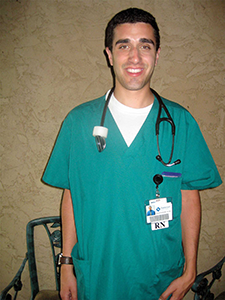Nursing alumnus wants to be a role model for other males pursuing nursing degrees
For Andrew Fruhschien ’08, the urge to heal and teach came early. The decision to combine the two—as a nurse practitioner—was more circuitous.


For Andrew Fruhschien ’08, the urge to heal and teach came early. The decision to combine the two—as a nurse practitioner—was more circuitous.
“I started out in college as a biology major, thinking about medical school. There’s still a bit of a stigma with men in the profession, although it’s changing. It’s a cultural thing, a societal thing, and so men often pursue the medical route,” he said. “But I switched halfway through my freshman year. For me, biology was very dry.”
As it turned out, he didn’t have to look far for role models. He already had them. An EMT since he was 16, Fruhschien worked closely with a couple of males nurses on a first aid squad in Edison. Cool under fire, “they taught me the value of patience, teaching and motivating others,” he recalled.
And then it struck him senior year that he, too, could play an influential role in the health care arena—as an educator.
“Giving back to the profession was such a powerful idea. And being a man involved in nursing education seemed to offer so many opportunities. There is a need for role models. I really felt I could make a difference,” he said.
The teaching part came naturally.
“It began with my experience working on the first aid squad. I would do a quality review after every call, and didn’t realize I was teaching,” he said.
While working as a nurse in the emergency trauma department of Hackensack University Medical Center, Fruhschien applied for—and received—a scholarship to attend graduate school from the New Jersey Nursing Initiative (NJNI). A joint project of the Robert Wood Johnson Foundation and the New Jersey Chamber of Commerce Foundation, NJNI addresses the state’s nurse faculty shortage by supporting up-and-coming teachers, among other objectives.
When he completes his master’s degree at Fairleigh Dickinson University next summer, he’ll be licensed as a nurse practitioner in adult primary care, with a concentration in nursing education. He expects to start by teaching clinical classes to students planning to work in hospitals or by overseeing a high fidelity simulation lab, where he will use computer-operated mannequins to guide students’ responses to complex, evolving health scenarios.
Fruhschien is an ardent advocate of a much broader deployment of technology, and not just via the expensive devices used by specialists, but in everyday situations that will transform the way health care is delivered.
“We need to incorporate it better. We spend a lot of time memorizing things, for example, like dosage levels, that we should be looking up on simple electronic devices. Instead, we should be putting greater weight on critical thinking,” he says, adding, “I like the role of technology advocate. I feel that this is one area where people just out of school are valuable educators.”
Fruhschien said that in addition to teaching and clinical practice, he is also interested in policy.
“We may never have a universal health care system, but we can figure out ways to deliver care that are smarter, cheaper and more efficient,” he says. “We can start by getting rid of a lot of time-consuming paperwork and by shifting the focus to primary care. We’re upside down now. We bring in expensive specialists after people are already sick.”
Nurses, he insists, should play a leading role in urging reform. Perhaps more than any other health care professionals, they understand not just treatments, but the people receiving them.
“The nurse’s voice is important here and it should be stronger. We have strong medical backgrounds, but we’re grounded in peoples’ lives.”
Posted on August 19, 2010

